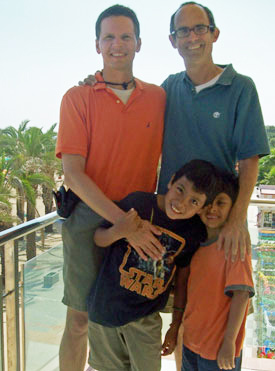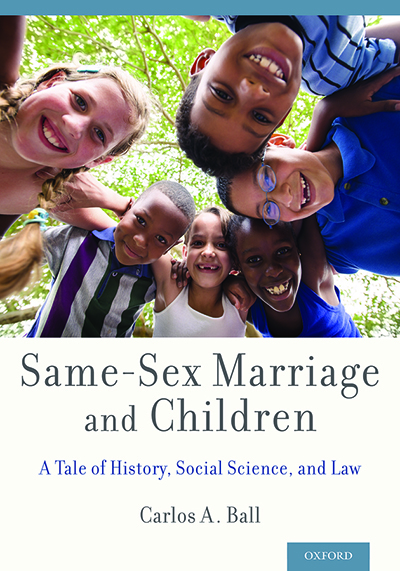 In a book published this month, a Rutgers law professor examines what makes a good parent and how marriage equality improves the welfare of children of same-sex couples
In a book published this month, a Rutgers law professor examines what makes a good parent and how marriage equality improves the welfare of children of same-sex couples
In a book published this month, a Rutgers law professor examines what makes a good parent and how marriage equality improves the welfare of children of same-sex couples. Rutgers University’s news service interviewed Ball, and shared the following article with Equally Wed.
The question of children’s welfare has been at the center of the legal and political debates over same-sex marriage for the last couple of decades.
 According to the 2010 Census – the first to provide same-sex couples that live together the option to report themselves as married partners – 48 percent of LGBT women and 20 percent of gay men under 50 are raising a child under age 18.
According to the 2010 Census – the first to provide same-sex couples that live together the option to report themselves as married partners – 48 percent of LGBT women and 20 percent of gay men under 50 are raising a child under age 18.
In his new book Same-Sex Marriage and Children: A Tale of History, Social Science, and Law (Oxford University Press, 2014), Carlos A. Ball, a professor at the Rutgers School of Law-Newark, takes a comprehensive look at the ways in which the child welfare arguments have been used to oppose same-sex marriage.
Rutgers Today spoke with Ball about the evolving view of families headed by same-sex couples on the occasion of the first Father’s Day since New Jersey recognized gay marriage.
Rutgers Today: Are arguments about the right to parent common throughout history?
Ball: The effort to prohibit same-sex couples from marrying is just the latest example of a recurring phenomenon in American history, as represented by earlier restrictions on marriage by individuals of different races and by people who are mentally disabled. In my research, I found that opponents of these marriages, like those who seek to prevent the legal recognition of same-sex marriage today, relied on the argument that the marriages were detrimental to children’s well-being.
Carlos A. Ball (r) with his partner, Richard Storrow, and their sons, Emmanuel and Sebastian, in Santa Susanna, Spain. Photo courtesy of Carlos A. Ball
The contemporary version of this argument is that children do best when raised by a mother and a father who are biologically related to them, and that households deviating from this type of family structure are somehow less than optimal. However, studies of families headed by same-sex parents conclude convincingly that these children are doing well: There is little statistical difference in terms of school performance, cognitive development, social functioning and emotional health between the children of gay and lesbian parents and heterosexual parents.
Rutgers Today: Who makes a good parent?
Ball: The social science literature is in line with what our intuitions tell us: Good parents are caring and nurturing, devote time to their children, discipline when necessary and are available emotionally. Factors such as parental gender and sexual orientation, as well as how families are formed, do not help us distinguish between good parents and bad ones.
Rutgers Today: How has the dynamic of families headed by same-sex couples evolved?
Ball: Until about 10 to 15 years ago, the majority of children being raised by gay and lesbian couples were born into heterosexual marriages. But since then, a significant change has occurred: Most lesbian and gay parents are now coming out first and becoming parents second, aided by developments in reproductive technologies and the increasing availability of surrogacy, adoption and foster care as means to parenthood. This has produced a large and growing number of children who are being raised by lesbians and gay men from the moment of birth or who were adopted shortly after birth.
 Rutgers Today: What has your research shown you about families headed by gay fathers?
Rutgers Today: What has your research shown you about families headed by gay fathers?
Ball: There has traditionally been more literature on lesbian mothers than on gay fathers. Over the last decade, however, we’ve started to see more studies of gay father households. Today, a larger number of gay men are pursuing fatherhood; gay men are now coming of age at a time when they have greater freedom legally and socially to become parents.
The studies of gay father households are entirely consistent with those of lesbian mothers: Gay fathers are doing a good job raising their children. Gay fathers, however, do face some challenges, including the perception that male couples are unable to provide children with the same kind of nurturing and caring available to children raised by mothers. But there is simply no support for this view in the social science literature.
Rutgers Today: How does marriage equality benefit children?
Ball: Marriage equality benefits the children of same-sex couples by providing them and their parents with the legal structure and rights that accompany marriage. But just as importantly, as the Supreme Court emphasized last year in striking down the Defense of Marriage Act as unconstitutional, marriage equality is crucial in protecting children from the stigma caused by the government when it relegates their families to second-class status. Children raised by parents who do not have the option of marrying inevitably perceive their families as less valid and legitimate than those of children whose parents are permitted by law to marry.
In addition to making legal rights and benefits available to children, marriage equality is about making sure that children understand that their families – regardless of their composition – deserve social recognition, respect and support.
This article is published courtesy of Rutgers, The State University of New Jersey































